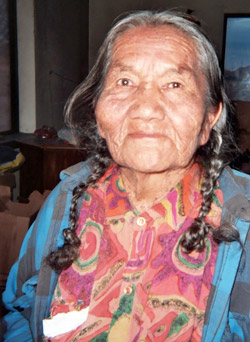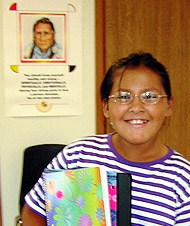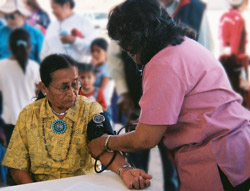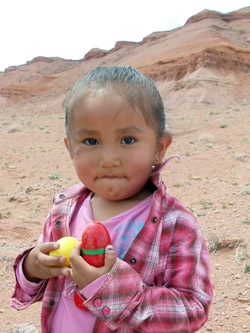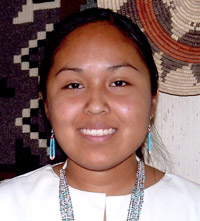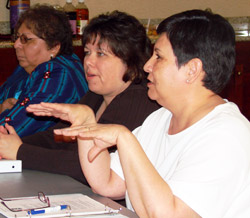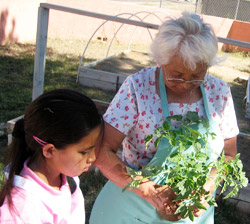 |
|||||||



OUR MISSION“Serving immediate needs. Supporting long-term solutions.”OUR VISION“Strong, self-sufficient Native American communities.” |

The foundation of NRC’s work is Asset-Based Community Development (ABCD). We build upon assets within the communities we serve, bringing together individuals, programs and outside resources to address challenges and support positive change. This community-driven model leverages the social capital of a larger network mobilizing toward a common solution. Local participation and empowerment are known to lead to sustainable gains and social change for the communities and people involved. Whether we approach this through Material Services or Long-Term Solutions, the key is developing and supporting momentum with many future leaders across many reservations and maintaining it over the long run. You can learn more about the logic model behind our programs in our Charting Impact report. Material Services Our Material Services address critical needs for Northern Plains reservations, Southwest reservations, education and animal welfare. Material Services include all the “major programs” or humanitarian needs we address through the provision of products and essential supplies as well as seasonal services. Click on the major program pages below to learn why these programs are needed and how NRC responds. As a donor, you may know these programs by their sub-brand names: American Indian Relief Council AIRC, American Indian Education Foundation AIEF, Council of Indian NationsCIN, Native American Aid NAA, Navajo Relief Fund NRF, Rescue Operation for Animals of the Reservation ROAR, Sioux Nation Relief Fund SNRF and Southwest Indian Relief Fund SWIRC. To learn more about the results of NRC programs, visit our Impact page.
The purpose of our Education services is to invest significant resources toward Native American education and assist Native American students of all ages in pre-kindergarten to high school. (See Long-Term Solutions for our higher education services.) Education is one of the most important cornerstones of self-sufficiency and quality of life. It is also a crucial factor in addressing the long-term poverty and other challenges on the reservations NRC serves. High school dropout rates range from 30 to 70% on these reservations. NRC furnishes essential school supplies for more than 44,000 K-12 students on 25+ reservations. We also support literacy for Native youth, providing supplies and incentives to encourage parent-child reading time. By addressing both immediate and long-term educational needs, NRC helps our partner schools and colleges motivate students and retention. NRC’s K-12 Education services include School Supplies and Literacy. These are marketed through our sub-brands: American Indian Education Foundation (AIEF) and American Indian Relief Council (AIRC). Our Health Services The purpose of our health services is supporting preventative care and health education initiatives conducted by our reservation partners serving tribal members.
The healthy lifestyle programs offered by our reservation partners and supported by NRC through our partners serve 250,000 Native Americans each year, through:
Our Food & Water Services The purpose of our Food & Water services is to ease food insecurity among Native American elders, children and families on the reservations we serve.
NRC helps meet immediate nutritional needs for 195,000 people each year by supplying:
The purpose of our Holiday services is to help our reservation partners spread community cheer and participation at times when many families are experiencing more stress and disenfranchisement. Native American Elders and children on the reservations assisted by NRC are certainly aware of holidays celebrated across the U.S., but frequently their families cannot afford special holiday gifts or extras. Up to 43% of Native American children live in poverty, many of them raised by grandparents on severely limited, fixed incomes. The rates of poverty on the 65 reservations served by NRC range from 38% to 85%. NRC provides holiday gift stockings for nearly 70,000 children, teens and Elders during the Christmas holiday season. These stockings are filled with practical items to meet immediate needs. In addition, children and families receive incentives and prizes when they come together to participate in spring, Easter and other community gatherings. These types of holiday events also help partners and local volunteers develop skills for future event planning and community service. NRC’s Holiday services include Children’s Stockings, Elder Gift Bags, Santa Stops (describe), and Easter Incentives. These are marketed through our sub-brands: American Indian Relief Council (AIRC), Council of Indian Nations (CIN), Native American Aid (NAA), Sioux Nation Relief Fund (SNRF) and Southwest Indian Relief Council (SWIRC). Our Community Support Services The purpose of our Community Support services is to help reservation partners motivate involvement in community service, and to support programs concerned with animal welfare on the reservations.
NRC supports activities and projects designed by our reservation partners to increase community involvement in schools, elderly service programs and wellness initiatives and to reduce isolation. In addition, NRC helps address community concerns related to animal welfare, including supporting spay/neuter clinics and supplying veterinary programs with much needed food. This enables added care that helps reduce animal health risk and related community health risk on 15 reservations. Our community services benefit more than 114,000 Native Americans as well as animals under our reservation partners’ care. NRC’s Community Support services include Incentives (for positive activities and behaviors), Hug-A-Bear (for children in trauma), Activities (for Elder projects and companionship) and Animal Welfare (for rescue and rehabilitation). These are marketed through our sub-brands: Rescue Operation for Animals of the Reservation (ROAR), American Indian Relief Council (AIRC), Council of Indian Nations (CIN) and Southwest Indian Relief Council (SWIRC). Our Emergency Services
The physical environment on the reservations NRC supports is often harsh, giving rise to a wide range of environmental disasters such as floods, forest fires, blizzards, ice storms, tornados and hurricanes. Some communities also experience acute or chronic contaminated-water emergencies. In addition, 40% of Native Americans live in sub-standard, overcrowded housing and the typical wait time for tribal housing assistance is three years or more. As a first responder, NRC provides immediate disaster relief for tribal members who are displaced due to blizzards, hurricanes, floods, and contaminated water emergencies. NRC also offers seasonal support to selected reservation communities based on need. Due to the expense and logistics, NRC is unable to offer these services to all reservations. We also rotate these services to different communities to avoid creating dependency. Our Emergency Services benefit nearly 54,000 people a year through:
Our Long-Term Solutions NRC’s Long-Term Solutions are critical to our vision of strong, self-sufficient Native American communities. Our long-term services are designed to support the self-determined initiatives of reservation partners and other local leaders who are working for sustainable gains in their communities. While our Long-Term Solutions are NRC’s newest services, they are already yielding positive outcomes for partners, participants and communities on the reservations.
The purpose of Higher Education Services is to increase college access and retention for Native American students. Until now, these services were included under Material Services, but upcoming enhancements to our scholarships and transition camps and the way we are tracking results put these more squarely under Long-Term Solutions. Only 17% of Native American students start college and only 11% complete college. Non-Native students are twice as likely to achieve a college degree. Many Native students believe college is not an option for them and, contrary to public perception, college is not free for Native Americans. For Native American students pursuing a higher education, NRC provides scholarships for undergraduate and graduate students. We focus on applicants who are most often in the middle range of the academic ranking but who have serious drive and a demonstrated ability to overcome obstacles. NRC also supports transition camps to motivate a college mindset and prepare Native students for freshmen year. And we make grants to tribal colleges, universities, and other groups committed to Native American education and increasing retention and funding for Native students. Our Higher Education services assist more than 500 Native students each year. NRC’s Higher Education Services include Scholarships, Emergency Funds (to support retention), Challenge Grants (to increase Native student funding), Tools of the Trade (to provide requisite tools for degree programs), and Transition Camps (to support college readiness). These are marketed through our American Indian Education Foundation (AIEF) sub-brand and also supported by foundations, corporations and individual major funders.
The purpose of our Capacity Building services is to equip reservation partners and nominated community leaders who want to make a greater contribution toward serving their communities. Pilot testing of our new and improved partner training was successful — it is unlike any offered in Indian country. This new training is a direct result of feedback from our reservation partners about needs and next steps that will help them be more effective. NRC has been testing and revamping our training service with reservation partners since 2012. Currently, our Capacity Building program includes one service: 4 Directions Development Program (4D). This training is designed around a six-month program, with partners committing to self-identified personal and professional development goals and working with mentors for support in attaining their goals. NRC monitors the progress of our 4D participants for three years after completion of the training. In the meantime, check out our early 4D results from the Fall 2014 cohort. NRC is currently expanding Capacity Building services for both Southwest and Northern Plains reservations. Our Community Investment Projects The purpose of Community Investment Projects is to support community leaders who drive grassroots projects in reservation communities. These one-of-a-kind projects aim to positively impact the lives of tribal members and to deliver some type of sustainable gain for Native communities — thus the name “Community Investment Projects” (CIP).
NRC’s Capacity Building services and Community Investment Projects are marketed under the National Relief Charities name. Our Higher Education services are marketed under our American Indian Education Foundation (AIEF) sub-brand. |
||||||||||||||||||||||
 |
View the PWNA Homepage Partnership With Native Americans ©2023 All rights reserved. |
